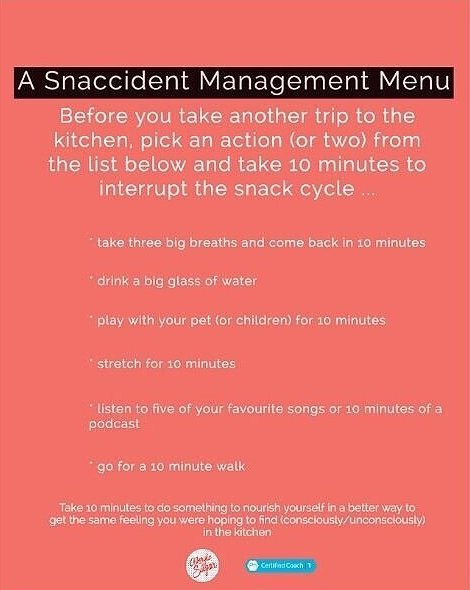Snacks vs Treats
One of the great Lockdown of 2020 jokes is that some of us have said we should be practising physical distancing from the fridge. And I doubt there are very few people in the world who could honestly say that they haven’t had a few extra snacks (or done some extra baking) over the last few weeks.
Just to preface this blog, it’s important to point out that snacks are not recommended unless you are trying to maintain weight, or you need to raise your blood sugar levels (i.e feeling light headed after exercise, or if you are feeling hypoglycaemic). A snack is actually like a mini-meal. It should be a mix of whole and nutritious proteins, fats and carbohydrates. If it is not, it is a treat.
Nutritious snacks are fresh, real, unprocessed foods. Fruits, vegetables, nuts & seeds and yoghurt boost our energy levels and our moods. They stabilise our blood sugars and fill in a nutritional gap sustaining our fullness which can actually stop overeating at our next meal.
A healthy-ish snack can be a prepackaged option but watch for the added sugar and salt. There is definitely some redeeming nutritional value in these however they should be sometimes snacks. Those Baked Peas … I’m talking about you! Look for single-serve greek yoghurt, wasabi or tamari flavoured almonds, chia pods and crackers made from whole grains, seeds and beans. But read the labels first! Choose snacks with fewer than 200 calories per serving and less than 10 grams of fat and/or sugar.
Treats. A treat is not a between-meal snack. Chocolate, ice cream, lollies, yes these are the obvious ones. Sugary and milky coffee drinks can be part of a healthy diet, but they are not a snack. Sometimes it can be very hard to tell so bear this in mind;
Fruit-flavoured candies like Skittles and gummy bears don’t count as fruit.
Chips with a dusting of spinach and carrot powder are not vegetables.
Muffins are cupcakes without icing. Gluten-free or not!
And those chocolate-dipped granola bars and antioxidant-rich chocolate-covered blueberries? Those are sweets.
Our trips into the kitchen, which may be happening more frequently, happen for a few reasons. Identifying WHY we find ourselves in the pantry means we have a good chance of stopping it from happening or at least decreasing the regularity of it.
Our hunger hormone, ghrelin, is quite the beast. We hope, we wish, that the honeymoon period when it is not rearing its ugly head lasts for as long as possible however the old habits, the old mindset, take a lot longer to change. For most of it, we will be working on it for the rest of our lives.
We snack mindlessly. There is a well-worn path to the kitchen which we can walk without even thinking. We are focused on our phones, our families, working from home, schooling at home, keeping everyone (especially ourselves) sane. We don’t even realise when we have opened the biscuit tin or taken a piece of that slice that we baked.
To make a change - get rid of the distractions, have a mini schedule of meals and snacks (if absolutely required) and stick to that. Create a new habit of being mindful, more aware, when it is time to have something to eat.We eat for emotional reasons. We don’t feel full or satisfied because it is not actually our hunger that we are feeding.
To make a change - use the tools you have collected from the MindPrep videos, Retreat Programmes or talk to the team about another appointment. If you want some help or some Mindset Coaching, check out the Resources on this site.
We are either bored with our meals and snacks or not actually satisfied by them. One of my mantras is to EAT WHAT YOU LIKE (enjoy). If our meals bore us or are unappetising, those plates won’t be satisfying at all.
To make a change - eat the foods you actually like and most of the time, you actually end up eating less overall. Experiment with some new foods, some new herbs and spices. New foods are exciting and enjoyable! Adding new flavours is one of the easiest places to start to change up our meals and it is quite possible there is a herb or spice you forgot about in your cupboard that you found during one of those lockdown cleaning missions. Or download one of my new Recipe Packs.
We are just bored. No amount or type of food will fix this. We have some other work to do here.
To make a change - keep a notebook and journal when you are eating and what is going on at that time. In my Coaching Projects, we talk of Notice and Name. Being observant of our environment and our thoughts help us create new habits ie when I’m feeling sad, I play very loud music.
To break the cycle of the Snaccident (my nickname for those “why did I eat that?” moments), we break it down into simple chunks. I was going to write bites … okay, I did write bites. From the reasons above, can you pick your number one? Whilst you are working through that, the next time you find yourself strolling into the kitchen, try and catch yourself first. Give yourself 10 minutes to do something else and to take the time to ask yourself and your body, are you actually hungry?
If snacking, or Snaccident Management, is something you would like more help with, I’ve spent some of my time in Lockdown (and taking 10 minutes away from my fridge) creating a Quick Habits Based Coaching Program especially for this. I’ve also created four Recipe Packs that include some nutritious and delicious snacks (as well as sample Meal Plans and Shopping Lists).
Remember you aren’t alone. A lot of us are in this situation at the moment. But if it is something that you want to change, you need to take a step towards doing something about it.
Made for You Recipe Packs - https://allergictosugar.co.nz/recipe-packs/
The Snaccident Management Coaching Project - https://allergictosugar.co.nz/product/the-snaccident-management-project/


